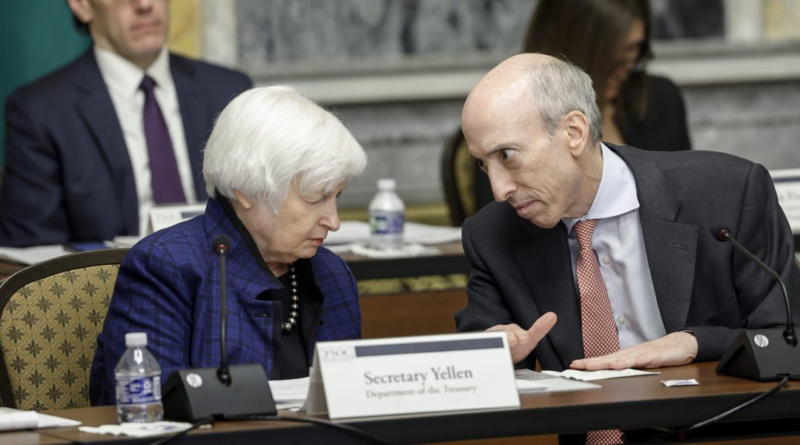The big crypto winner of the midterms? The SEC and CFTC
In the turbulent world of crypto, the U.S. midterms on Tuesday were overshadowed by the stunning collapse of FTX, the world’s fourth-biggest exchange, led by D.C. favorite Sam Bankman-Fried.
Industry onlookers hoped that when the dust settled from the elections, Congress finally would work toward passing crypto legislation, whether during the lame-duck period or the following session.
With Democrats performing better than expected and Bankman-Fried’s fall from grace, experts say any legislation likely will take even longer. Amid the regulatory vacuum, that means the winners will be the Securities and Exchange Commission and the Commodity Futures Trading Commission, which can continue making ad-hoc enforcement decisions and jockeying for power.
“The longer it takes Congress to do anything, the more the SEC and the CFTC are going to feel the need to step in,” said Charley Cooper, managing director at the blockchain firm R3 and a former chief of staff at the CFTC.
Although Congress has yet to pass legislation establishing a regulatory framework for the industry, proposed crypto bills have been floating around both the Senate and the House, including the Senate Agriculture Committee’s Digital Commodities Consumer Protection Act, which Bankman-Fried supported.
Because the most prominent bills were bipartisan-led, Brett Quick, the head of government affairs at the Crypto Council for Innovation, a trade association that includes FTX US, said that the electoral outcome wouldn’t impact legislation.
Many of the most vocal supporters of crypto were elected, including Ted Budd, a Republican who won the open Senate seat in North Carolina, and J.D. Vance, a Republican who won the open Senate seat in Ohio against another crypto advocate, Democrat Tim Ryan.
Even so, with Democrats outperforming polling and Republicans having less of a governing advantage than expected, Quick cautioned that any progress for legislation may come slower.
“When you have such tight margins in Congress and a divided government, it just makes legislating more difficult,” she told Fortune. “That naturally creates a dynamic where there’s a lot more opportunity at the agencies.”
‘Unable to police itself’
Industry players have long complained how crypto’s legislative void has allowed the SEC and the CFTC to regulate by enforcement—SEC Chair Gary Gensler declared most cryptocurrencies are securities, and the CFTC has handed down controversial decisions, such as in the Ooki DAO case—and that dynamic only was exacerbated with the proposed takeover of FTX, although Binance has since backtracked.
On Wednesday, Bloomberg reported that the SEC and CFTC have both launched probes into FTX over its handling of customer deposits.
“The general perception yesterday of it just being a wild, out-of-control day, a nascent industry unable to police itself and significant players jousting for positions is going to get the attention of regulators in Washington,” Cooper explained. “They’re going to wonder if they can wait for Congress to act or if they need to step in more aggressively.”
Sign up for the Fortune Features email list so you don’t miss our biggest features, exclusive interviews, and investigations.




